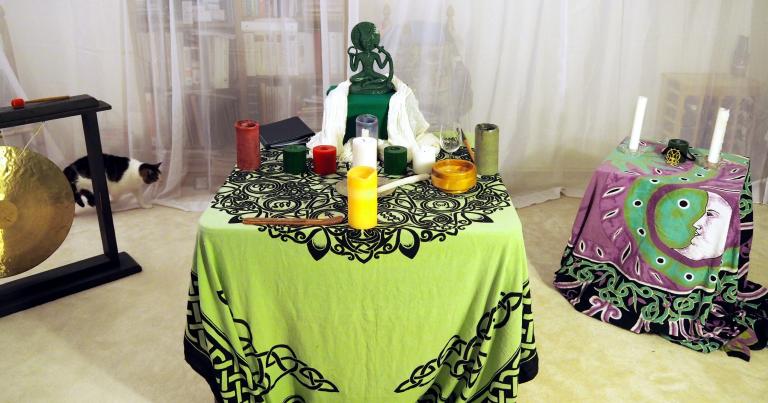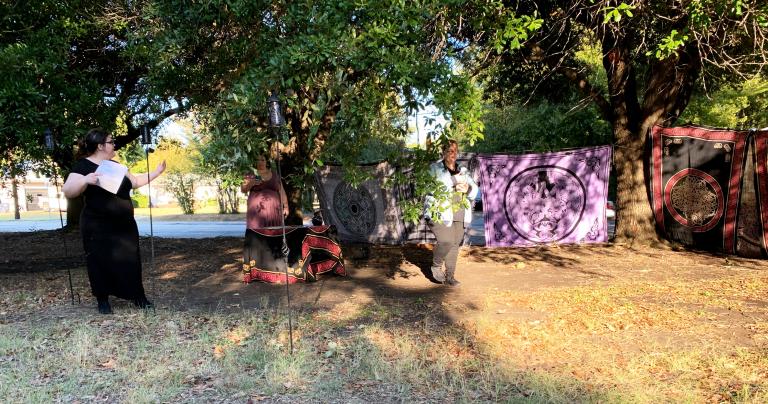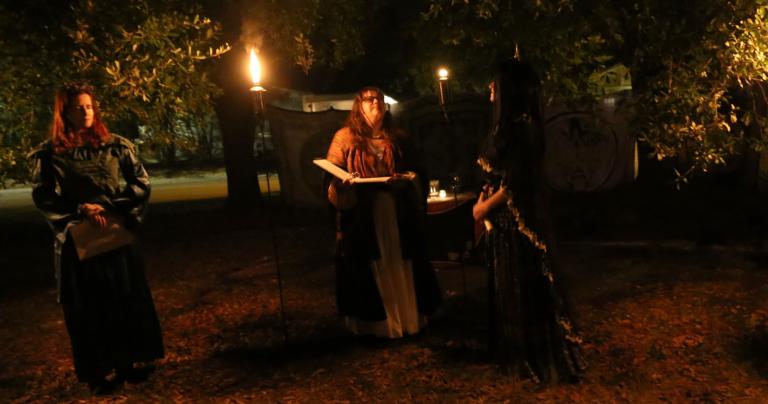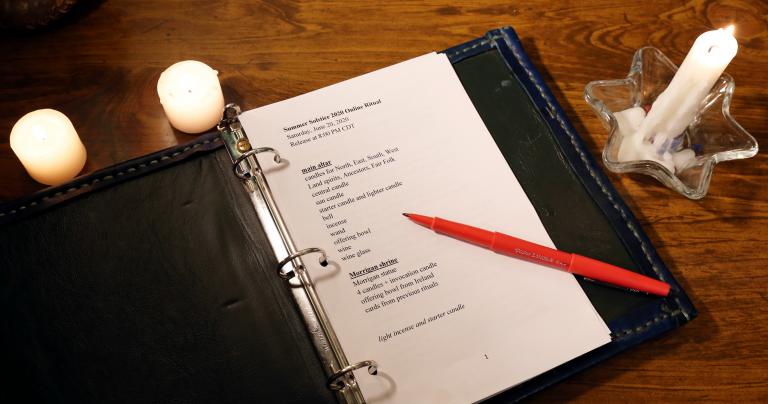This question came out of the Operative Magic on-line class I’m currently teaching. Whether it’s a public ritual, a private devotion, an informal spell, or a multi-step magical working, sometimes things don’t go according to plan. You forget an element, skip a line, or mispronounce a word. A trickster deity shows up unexpectedly and throws things into disarray. Or perhaps a skilled and experienced priestess manages to set her hair on fire while lighting a candle.
I’ve been doing public ritual for 17 years. I’ve yet to do one perfectly. At my first Pantheacon I botched the Druid’s Prayer, and I say that prayer every morning (at that point, for three years straight). Smaller and less formal workings tend to go as planned, but some of that is because the plans are pretty vague.
My approach to mistakes in ritual can be summarized in two points:
- Don’t be afraid to make a mistake.
- And also, do everything you can to keep from making a mistake.
Some of this comes with experience. When things go wrong but the ritual still works fine, you learn that perfection isn’t necessary. When you assume you’ve got this because you’ve done it before and then you stumble through it and it comes off flat, you learn that preparation is always necessary.
Until you get that first-hand experience, here are some guidelines and suggestions for dealing with the inevitable mistakes.

What is a ritual mistake, anyway?
I have a Druid friend who likes to say “if your heart is in the right place you can’t do it wrong.” There’s something to be said for good intentions and honest effort, but ultimately I don’t agree. A public high day ritual with multiple missteps may not be offensive to the Gods, but it will be less effective in facilitating a religious experience by the participants. And while we rightly give beginners a lot of credit for putting themselves out there and trying hard, experienced ritualists should know and do better.
In my experience, the Gods generally – but not always – treat devotional errors and offenses similarly. They cut beginners a lot of slack. The deeper you go, the more is expected of you, and the less tolerance there is for errors and omissions.
Intent is important in magical workings, but magic works by actions. If you do the spell wrong, the results you get will be less than if you had done it right – if the spell works at all.
The four-year-old who cries “but I didn’t mean to” may very well be telling the absolute truth. But the glass that got knocked off the table is still broken.

What impact does your mistake have?
Not all mistakes are equal. Forgetting to light the incense isn’t the same as forgetting to invoke the Deity of the Occasion. Mispronouncing a word (and remember – “correct” pronunciations vary by location and by time) isn’t the same as using a word that doesn’t mean what you think it means.
I’ve been in rituals where the central fire went out and it was no big deal, because it wasn’t a major part of the ritual. I’ve been in other rituals where the central fire was a critical element of the working, so we assigned one person to do nothing but make sure it didn’t go out for any reason.
When you notice a mistake, your first task is to quickly and unobtrusively determine what impact that mistake has on what you’re trying to accomplish. Depending on that, there are several things you can do.
Keep going
If a musician hits a wrong note in a concert, they don’t apologize, they don’t go back and play it again, and they certainly don’t stop the song. They just keep going like it was meant to be that way all along.
Last night’s Summer Solstice Ritual was not perfect. There were a few obvious mistakes: I poured wine too fast and spilled some, and I stumbled over a few words. Did you notice that when you were following along? Some of you probably did, but others didn’t.
There’s another mistake in that ritual that you can’t notice, because you don’t know what I wrote in the script that I accidentally skipped over. When I realized what I skipped, I decided to keep going. Since this wasn’t done live I could have gone back and re-recorded it, but after watching the video, I decided it was fine the way it was.
Many times the best response to a mistake is to simply ignore it and keep going.
Fix it and keep going
You forget to light the incense. The wind blows a candle out. You skip an important line, but you’re not done speaking and you can add it to end of this section.
Sometimes mistakes can be fixed on the fly. With a little bit of improvisation you can make it look like it was supposed to be that way all along.
Go back and do it right
Not every mistake is a simple theatrical misstep. Sometimes you skip over a whole section of the ritual and don’t realize it until much later. You’re working a spell and you leave out a key ingredient. These mistakes can’t be ignored – the working will be inadequate with them.
So you find a logical stopping point and you go back and do it right.
I never point out mistakes in a public ritual. There’s no need to take people’s attention away from the themes and spirits of the event and focus it on your error. If someone asks about it afterwards, of course I’ll admit the mistake. But I don’t want to amplify the error by calling it out in the moment.
In a private ritual I’ll generally point it out, because everyone generally knows what should have been done.
If it’s a short, solitary working I may end it and start over… assuming you can, that is.
Magic has many different traditions with many different rules and rubrics. Follow the ones for the tradition in which you’re working. If you don’t know what those rules and rubrics are, you probably shouldn’t be doing that ritual or spell.
Make piacular offerings
Thanks to ADF Priest Rev. Lauren Mart for this word, which means “making atonement.” If your mistake is less of a technical misstep and more of an insult or slight to a God or other spiritual being, ignoring it and moving on may be inadequate. Where offense is given, the proper response is acknowledgement, apology, and making it right.
Words alone aren’t always enough. Sometimes making it right means pouring an additional libation or singing another hymn of praise during the ritual. Other times it means performing an additional ritual with a special sacrifice. I’ve had to do that on a couple occasions, including one where I wasn’t even part of the original offense (no, I can’t tell that story – just know that “collective debt” is a real thing).
Avoiding mistakes in the first place
Just as a broken glass can’t be put back together, not every ritual error can be fixed cleanly and easily. If you’re summoning demons and you forget to draw the triangle, you’re pretty much screwed (why were you summoning demons in the first place???).
The best way to deal with errors is to not make them.
Study
My father was fond of the saying “a wise man learns from his mistakes – a fool will learn no other way.”
I burned my fingers with magic several times when I was first starting out. I think we all have. Some of those painful lessons were necessary. But one of the things they taught me was to understand up front what I’m doing, how it’s supposed to work, and what’s likely to go wrong.
This is especially important when you’re picking up a new magical technique, or if you’re “borrowing” magical tech from an unfamiliar system or culture. Even if borrowing doesn’t rise to the level of cultural appropriation, if you take something out of context it may not work in the way you expect it to work.
Read. Study. Talk to people who’ve done it before. Learn from others so you don’t have to learn from mistakes that may be painful.
Plan
There’s an entire chapter on rituals and ritual planning in The Path of Paganism. It starts with the story of how I planned my first public ritual back in 2003… and how I almost backed out of it. I was nervous and afraid of doing it wrong. In the end, I did it because my desire to lead a ritual was greater than my fear of messing it up. It went well because I planned the whole thing out in detail.
17 years later, I still do that with every public ritual I lead. The ritual scripts are more than just the words to say and who’s supposed to say them. They include movements, ritual objects, music, and everything else that’s going to happen. For this year’s Summer Solstice ritual I added camera notes – what I wanted to focus on for each segment.
Writing it down forces me to think about what I’m doing. By the time I do the ritual, I’ve already walked through it in my head countless times – and spotted multiple instances where something either won’t work, or could be done better a different way.
I’ve worked with this liturgy for long enough I don’t have to have a script. When I did the on-line Spring Equinox ritual I worked from memory – it went fine. Simple spells don’t need elaborate scripts.
But the more you plan something out in advance, the better it will be, and the less chance there is of doing something wrong.
Rehearsal
Walking through a ritual in your head is a good thing. Walking through it in person is better.
Nothing gives you the confidence to do something like having done it before. So practice the ritual before you do it for real. I did a full dress rehearsal for the livestream Beltane ritual. When I did, I realized I needed to rearrange some of the item on the altar. I verified that the microphone would pick up my voice when I was off-camera. Unfortunately, I wasn’t able to test the upload delay, so when I did it for real I thought I wasn’t on-line when I really was.
Public ritual is in part sacred theater. You wouldn’t stage a performance of Macbeth or King Lear without rehearsals – why would you try sacred ritual without rehearsing it first?

“If I practice, am I doing the ritual ahead of time?”
For a seasonal ritual, this isn’t relevant – it doesn’t matter if you do it once or twice or ten times. I rehearsed the Headless Rite multiple times before I did it for real (and I was told my pronunciation of the barbarous words was still pretty bad) – that’s a ritual many people do on an semi-regular basis.
For a more involved working this may be a legitimate concern. You can’t really practice an initiatory ordeal. If the ritual is intended to produce a particular effect, you may only want that to happen once.
Think through what you’re doing. Are there key words you can omit during the rehearsal? Key elements you can leave out? Sometimes disclaimers work (“this is how this would sound if I was doing it for real, which I’m not”) and sometimes they don’t. At the very least, you can walk through each segment without performing it and make sure you have everything you need to do it right when you do it for real.

Try to be perfect – accept that you’re not
It’s perfectly normal to be afraid you’re going to make a mistake in a ritual, spell, or other magical or spiritual working. That fear shows you respect the sanctity of what you’re doing, and the power involved with it. Let that be a healthy fear that motivates you to think, plan, and practice.
And then accept that you’re never going to do it perfectly. Your choices are to do it imperfectly or to not do it at all.
And that’s a pretty easy decision.
May your rituals be strong, your planning effective, your mistakes few, and your recoveries quick and seamless.


















